I really wish Hardline could deal with being a bad cop. The lack of rewards, unlocks or even acknowledgement for shooting people means it all takes place in a weird moral environment, where only good exists.
This post originally appeared on Kotaku UK.
The way it handles bad behaviour – by allowing but completely ignoring it – feels like less of a solution and more outright denial. If you’re going to make a game that lets people play as a policeman you have to accept that people are probably going to play as a bad policeman. If you made a game about a nun, the first thing most players would do is see if they could punch anyone.
It’s an issue that haunts Hardline’s singleplayer mechanics and story. I saw comments on my previous impressions complaining about my mentioning this, which they saw as an attempt to inject unnecessary political commentary into their shooter, but I raise the issue because it has a very profound affect on gameplay. This is a shooter. You’re meant to shoot people. Your gun is literally the hand with which you reach out to touch the world. And the game says nothing when you do.
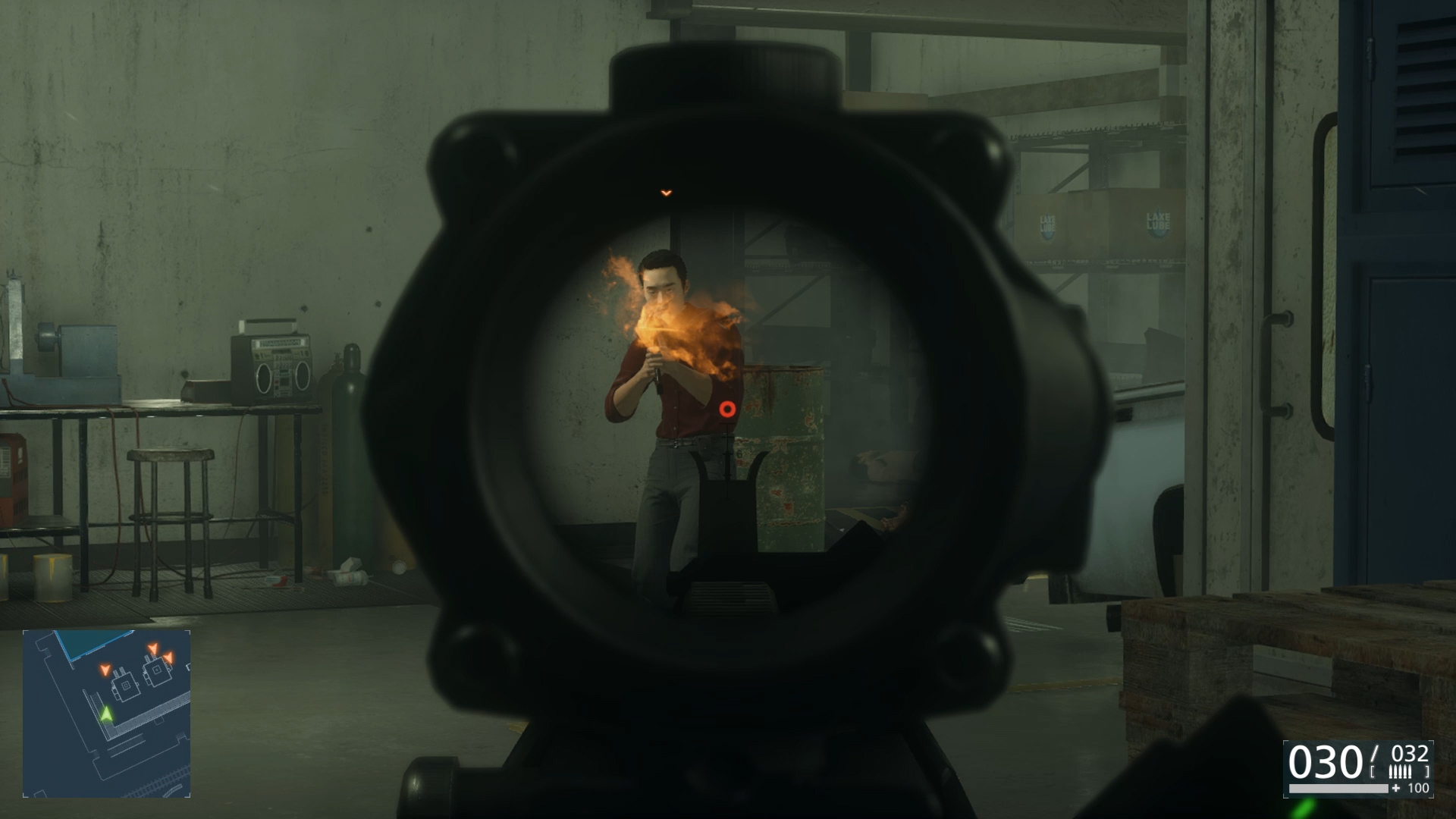
Sure, you can shoot people to hell and back. Played with guns blazing, it’s a good shooter. I love the smaller scale engagements, the trading of small arms fire in corridors or across warehouse floors. There’s a great change of pace and feel to using handguns and other lesser weapons to fight people in the same room, instead of battling through a canyon with an army issue BFG. But the game stays resolutely mute as you do, focusing instead on rewards and unlocks for arrests and takedowns. The chances are you will be spotted at some point along the way and there will be plenty of shooting, but it’s a weird set-up where you have to be stealthy and non-lethal to unlock guns the game then ignores when used.
The stealth setup is also mechanical but can be oddly satisfying. You flash a badge and approach up to three people, trying to keep them all in your sights as the unwatched slowly reach for their guns. Some episodes (the game has a TV show-style setup) involve open areas you have to infiltrate, using this method to essentially take down the guards. Level design seems to play a large factor in the fun here: some places I found enormously rewarding to slowly take apart, busting each patrol in turn until I’d ghosted it. Others can just feel like a chore and the alarm, when it goes up, can be a blessed relief rather than a punishment.
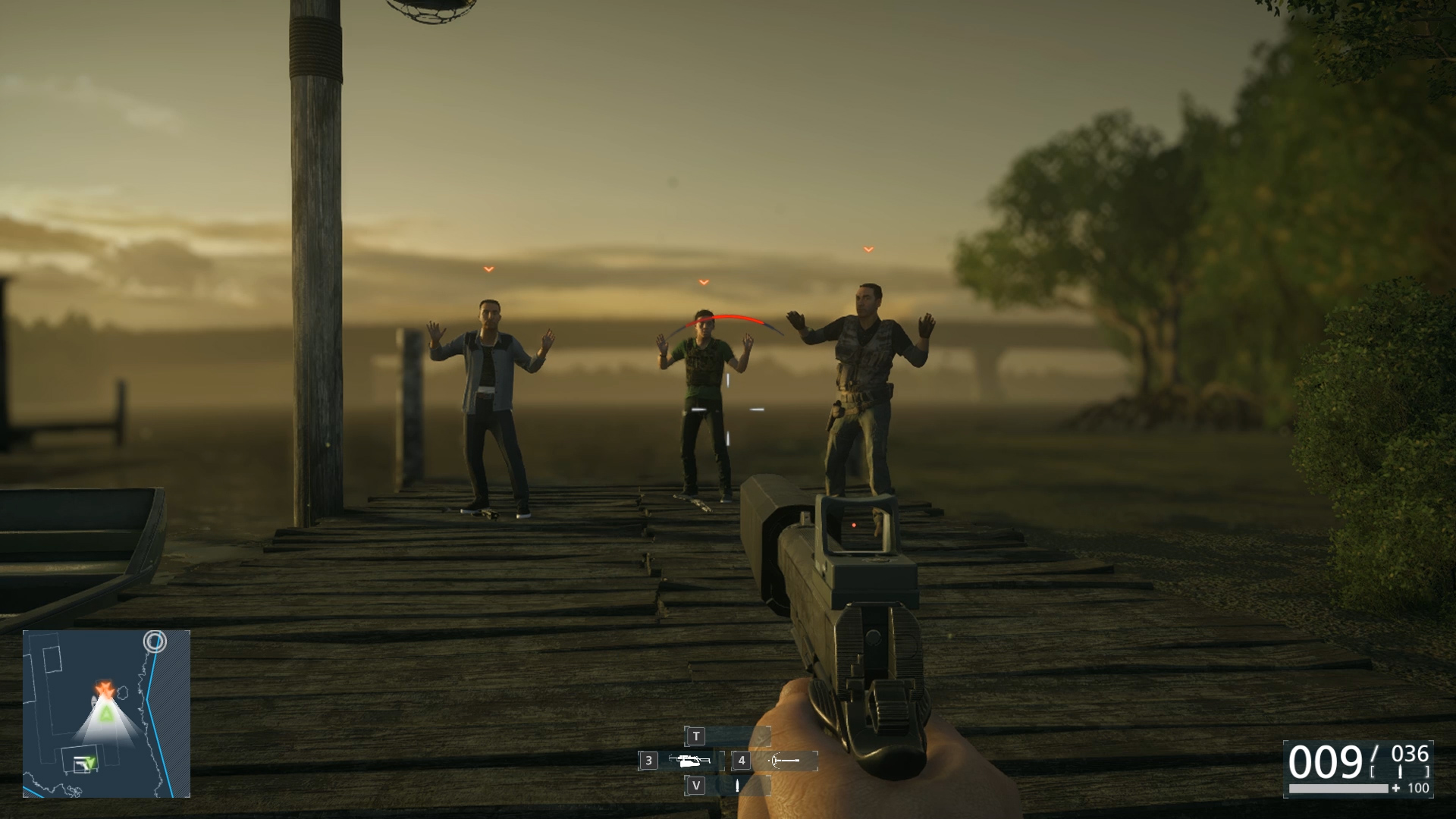
It’s a mechanic that struggles to explain itself as things progress. Busting and cuffing perps works on the streets but feels strange later in high security compounds or near warzones. Takedowns apparently send people compliantly off to sleep, while guards seem unable to grasp the concept of arrest, only acknowledging their companion is ‘down’ before deciding to search out the mysterious intruder responsible. I’m pretty sure the handcuffs are a clue there.
Throughout the singleplayer Hardline just doesn’t know what to do with its cop premise, struggling to make recognisable mechanics from the job work in the game – presumably because it’s assembled from Battlefield’s almost unchanged parts. Its also labours with a setup that tries its hardest to avoid any potential controversy. Despite all that goes on, you’ll never enter into direct conflict with other cops for example (bar a level where you only have a taser), even when you’re shooting the shit out of downtown Miami. Sure, enemies that turn up later might look and act like patrolmen, but they’re not – they’re a private security force that just happen to dress and act like cops, drive around in things that look like cop cars and apparently possess an overriding jurisdiction. Even the ethnicity of the various faceless criminal goons seems to have been very carefully thought out to rule out any possible accusations of anything racial.
Fortunately, while the singleplayer struggles to pull a police t-shirt over a fully kitted-out soldier, the multiplayer fares much better.
It’s almost as if the idea was pitched and signed off before anyone stopped to think about the potential issues of an off-the-book policeman wandering Miami with a small war’s worth of guns. An army shooter can charge into any unspecified country and blow the crap out anything that moves without question, apparently, but trying the same here seems to have made everyone a little skittish. Which is a shame because this is at its best when you just yell ‘fuck it!’, pull back whatever little lever makes the cool cocking noise and charge out shooting. Despite the game’s steadfast stance that you should be trying to arrest everyone, there are some good levels, setpieces worth seeing, and some really satisfying shootouts.
That struggle between army shooter mechanics and not-army shooter premise is the main problem. As ever the single player part is there for sales, built subtractively from Battlefield’s multiplayer bricks. So, as a cop, you obviously have no grenades but do have gas masks and, um, breaching charges in the TARDIS-like, ordnance-packed weapon crates conveniently scattered about the place. There’s a single-player level with Paracel Storm’s hurricane in from BF4 as well. It looks fantastic as the weather tears huge letters of a shopping mall but, like the tanks and gunships that make an appearance later, it’s there because it was available, no other reason.
Fortunately, while the singleplayer struggles to pull a police t-shirt over a fully kitted-out soldier, the multiplayer fares much better. That smaller scale in the main game creates tight and interesting shootouts here as well. Games feel fast, not because they’re over quickly, but because the more compact maps mean the action is always close. Levels can be large enough to feel spacious and make you regret not grabbing a vehicle, but not so much so that you spend all of your time running towards distant gunshots (my overriding memory of Battlefield 4).
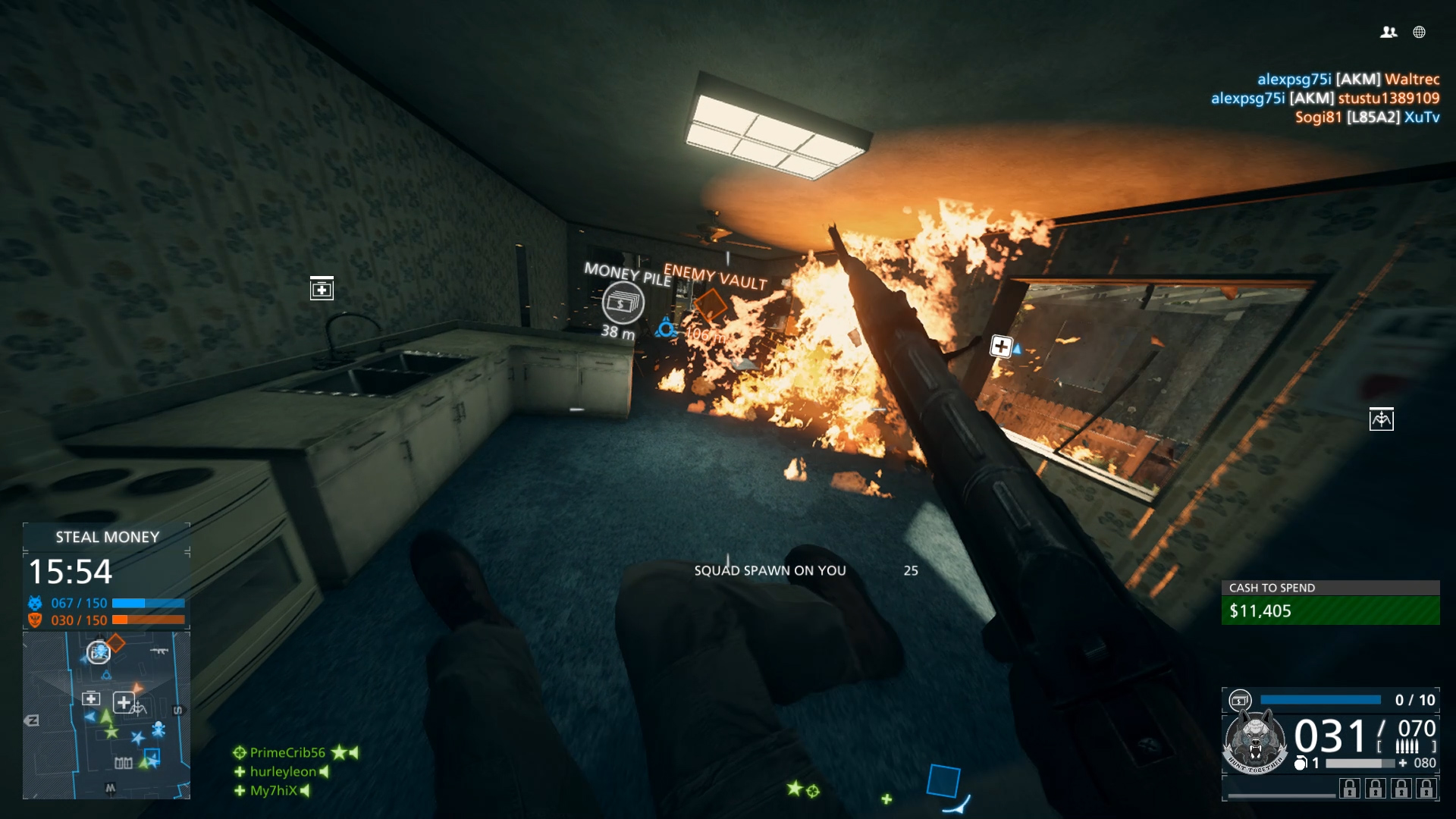
There are some really good modes too. Hotwire is basically the best new thing Battlefield’s done in a while, creating a sort of headquarters mode on wheels. Teams can only score points by stealing vehicles and driving them fast, creating glorious chaos as your squad hang out the windows taking potshots at other rides. It’s a game where you only exist in two states: hurtling at speed past car-to-car shootouts, or exploding thanks to some RPG or well-placed breaching charge.
Another strong mode is Bloodmoney. Think of it as a version of Capture The Flag where everyone can have flags all the time. You and the enemy both have a vault and there’s a money pile in the centre of the map. You can steal cash from the opposition’s vault, or the money pile, and have to get it back to your vault to score. Again, it’s chaos as the levels fill with people charging about the place with money-stuffed bags spewing notes, or fighting bloody stand-offs to control the money pile.
Whatever the modes, the levels seem really well designed for options given their occasionally small size. Take Bank Job, a map for the Heist mode where cops and criminals fight to protect/rob a single vault. It’s built around both teams facing each other more or less in a single building with few entry points. Somehow it rarely feels dull or safe with multiple corridors, levels and roof access making you feel exposed from every angle.
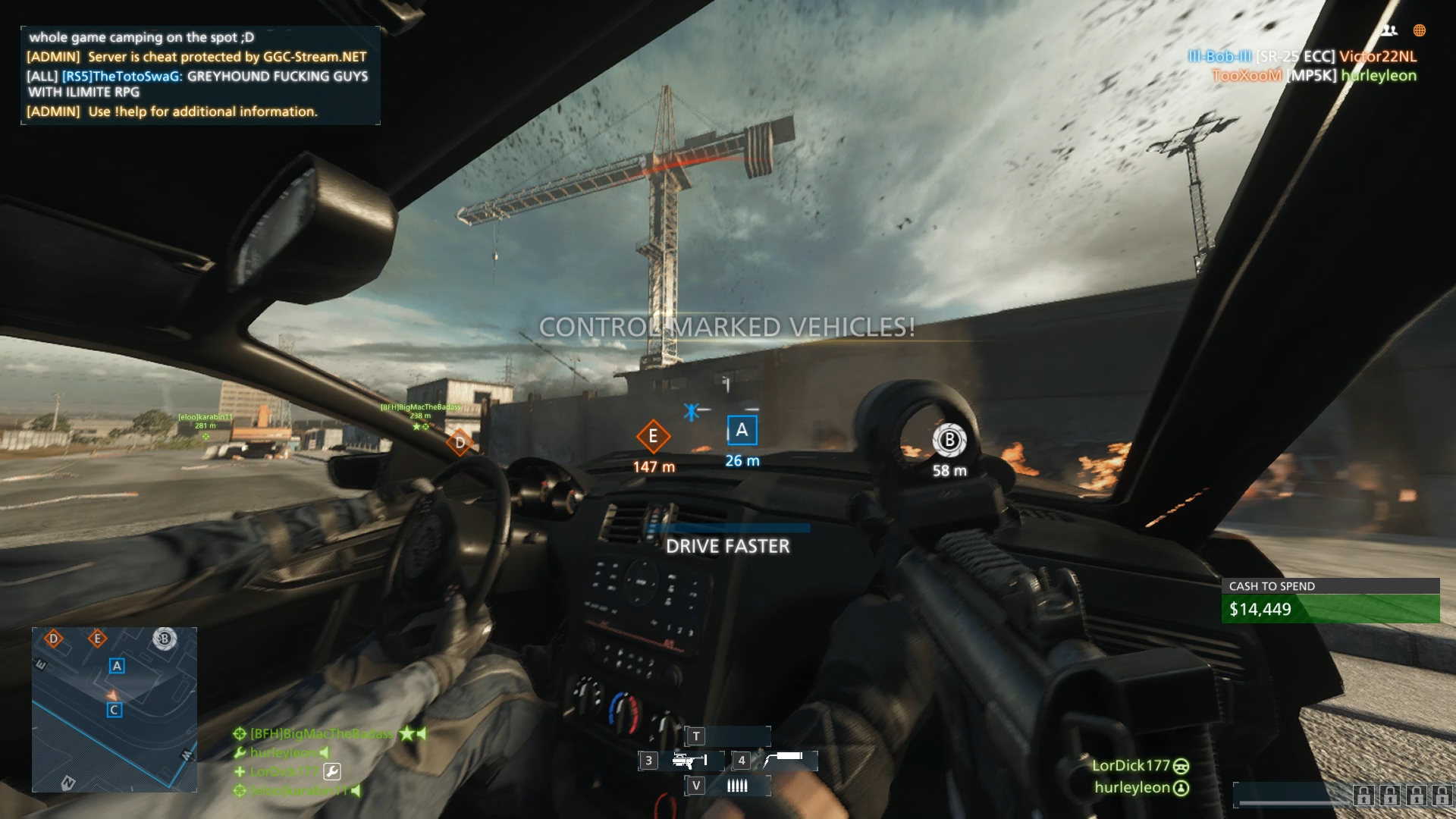
Another two modes, Rescue and Crosshair, shake things up by having no respawns. The first has cops trying to get hostages away from the criminals, while the second is a VIP escort mode. They’re undersubscribed compared to the other options I’ve mentioned, or series favourites like Conquest, which is a shame because sweeping a house knowing you only have one chance is an enjoyably tense alternative to the chaos elsewhere.
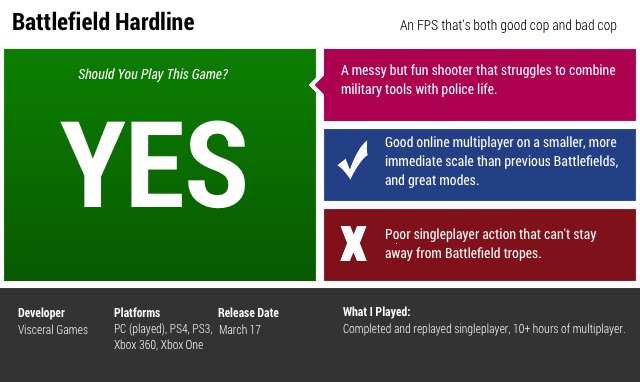
It’s a muddled package overall but not without its merits. The singleplayer’s action is enjoyable in places, with Battlefield 4‘s mechanics placed within a more urban playing field. But it’s also full of messy semantics apparently created by the fear of potential criticism that a war shooter in a policeman suit might attract. The multiplayer is where it’s really at (especially as, so far, the servers seem to be holding up), taking the smaller scale of the singleplayer settings and inspiration from the cop theme. It creates focused multiplayer variations that strip away much of the spaces between the fun of pretend-shooting other people – so that only the fun remains.

This post originally appeared on Kotaku UK, bringing you original reporting, game culture and humour with a U from the British isles.
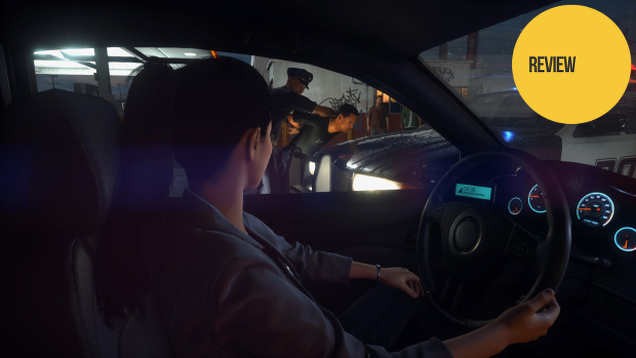
Comments
7 responses to “Battlefield Hardline: The Kotaku Review”
Loving Multiplayer, the fact that you can be the MVP and highest scorer without killing a single person is excellent, it forces people to play the objectives and that is the best thing.
All the previous BF’s no matter the game mode it was always more profitable to be a kill scrub instead of playing the objective.
Lets face it, solo campaigns in these games have been shocking for many many years. I actually think this is the best one in a long time. This game needed a change and think they did it beautifully. It’s still not an amazing campaign, just a lot better.
We all buy these games for multi-player anyway 🙂
I’ve been enjoying the singleplayer so far, yes it has its obvious downfalls and overlooks many of the ‘rules’ (who needs ’em) of being a police officer. But it does allow you to play the way you like, Guns blazing with reckless abandonment or careful and calculated. I’ve been playing through tagging enemies with my ‘magic evidence finder device’ or scanner for short, then trying to take down, arrest or tase the enemies as I sneak through the levels playing good cop.
The problem being that if you are caught there isnt much option but to open fire thus giving up your option to arrest the ‘warrant’ targets unless you happen to keep a taser on you at all times. So I often find myself getting myself shot simply to restart and try the ‘good cop’ approach again. I am in the final episode of the game as we speak and the storyline is good, although predictable in spots still manages to through in a twist or two and even if you see it coming the payout is still enjoyable.
The multiplayer is very good (and it WORKED from launch without a 15GB day one Patch?)
I’ve found myself playing through almost all of the game modes. Although I have found it difficult to play the ‘one life – objective’ game modes because the server population is quite low and often the games are very one sided if you do find one.
I have been considering getting Premium for the future DLC maps etc but also for priority in server queues and access to the ‘competitive’ side of the multiplayer as well as the increased customisation options.
Has any tried any of the premium features yet?
Is it worth the (quite significant) price tag?
I have noticed that multiplayer on XBOX One seems to be a bit rough.
If you play TDM and there are a large number of players (so far, 50 and above set this off) myself and others get the ol` rubber banding happen.
I do really enjoy the hot wire game type though, nice and small and as mentioned by @dnr, rewarded for objective game play instead of killing people.
For now though, I’d rate the online play a 7/10 (Once they fix the lag issues with TDM and maybe include a “small TDM”, I will rate it higher).
Possibly the best FPS on the XBOX One I’ve played to date (Wasn’t a fan of COD:Ghosts even on XBOX 360, Hated COD:AW and BF:4).
As someone who bought Battlefield 4 + Premium and watched that WHOLE saga (netcode etc.) unfold and was disheartened by the whole experience, I couldn’t help but feel trepidation around Hardline. I played the beta and thought, well this is nice enough, but isn’t this just a mod of BF4?
Is it truly worth the cost of a whole new game?
I’m happy to be wrong.
Its certainly not worth the Australian price… I would say its worth about 30 bucks. There is far less content than in BF4 and its horrendously unbalanced currently but there is fun to be had.
It does however have day one DLC which is pretty low of them.
I was worried about BF4 for just those reasons, but Hardline is worth the price, even just for the multiplayer, it works, its fun and its fairly well balanced within all the gamemodes